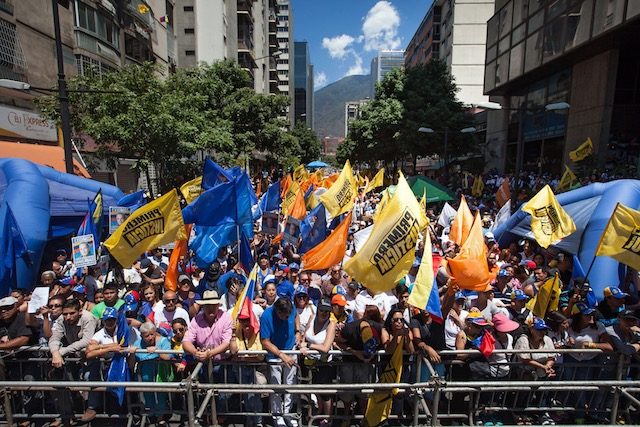SUMMARY
This is AI generated summarization, which may have errors. For context, always refer to the full article.

CARACAS Venezuela – Venezuela’s opposition held a national day of protest Saturday, March 12, the opening salvo in its new strategy to oust President Nicolas Maduro, who responded with a rally of his own.
With shouts of “Resign now!” thousands of Venezuelans demonstrated against Maduro in northeast Caracas, as the socialist president gathered thousands of his own red-clad supporters in the center of the capital to chants of “Maduro won’t go!”
No clashes were reported, a relief for a country torn by tensions and where anti-government protests in 2014 left 43 people dead.
The crowds on both sides numbered in the thousands, though no official turnout figures were immediately available.
Venezuela’s opposition is counting on the power of the street to force the deeply unpopular Maduro to listen to calls for change, after it won a landslide victory in legislative elections last December only to see the courts hamstring its new authority.
Seventeen years into the socialist “revolution” launched by the president’s late mentor Hugo Chavez, a punishing economic crisis has stoked outrage in the once-booming oil giant, where chronic shortages of basic goods, long lines and soaring prices have become the norm.
The fractious opposition coalition, the Democratic Unity Roundtable (MUD), spent weeks debating its plan of attack, then finally announced it would use not one but all options available to oust Maduro, including a recall referendum and a constitutional amendment reducing the presidential term.
But with an unfriendly Supreme Court likely to stand in its way, it is placing special emphasis on its call for protests.
Seeking to show he can still muster crowds himself, Maduro called his own rally, where he said his opponents had “gone crazy” and vowed to hang onto power “until the final day.”
“Let them come after me. The people are strong enough to take them on and win, constitutionally and peacefully,” said Maduro, his top military brass at his side.
Cuban President Raul Castro, Maduro’s top Latin American ally, said he was sending his Venezuelan counterpart his “unconditional support.”
Officially, Maduro’s rally was a protest against the United States’ decision to renew sanctions on several top Venezuelan officials, first imposed a year ago over a government crackdown on opposition leaders.
Caracas recalled its top diplomat in Washington on Wednesday, March 9, over the renewed spat.
But beneath the anti-American rhetoric that Maduro and Chavez have long relied upon to whip up their leftist supporters, the rally was a clear attempt to counter the opposition’s protests.
Maduro ‘can’t change reality’
The two demonstrations were held in different parts of the capital, but the security situation was nevertheless tense given the violence of 2014.
Anti-Maduro protesters had set up stands for people to sign a petition for a recall referendum against the president – which the opposition can call next month, when he reaches the halfway point of his term (2013-2019).
“The only way to change this failed system is to vote. So we’re working to get rid of Maduro as we have to,” said 23-year-old Moises Carvallo.
The protests come against the backdrop of a deep economic morass exacerbated by the crash in the price of oil, which long funded Chavez and Maduro’s lavish social spending.
Despite holding the world’s largest crude reserves, Venezuela’s economy contracted 5.7% last year, its second year of recession.
Political analysts say all the constitutional options to force Maduro from power face likely rejection by the Supreme Court or the National Electoral Council – both of which the opposition accuses the president of packing with allies.
But the president can’t ignore the voice of the people either, said analyst Luis Vicente Leon.
“What neither the government, nor the Supreme Court, nor the National Electoral Council can do is change reality. The majority of the population wants change,” he said.
“If an electoral process were held today, the opposition would win.” – Alexander Martinez, AFP / Rappler.com
Add a comment
How does this make you feel?
There are no comments yet. Add your comment to start the conversation.